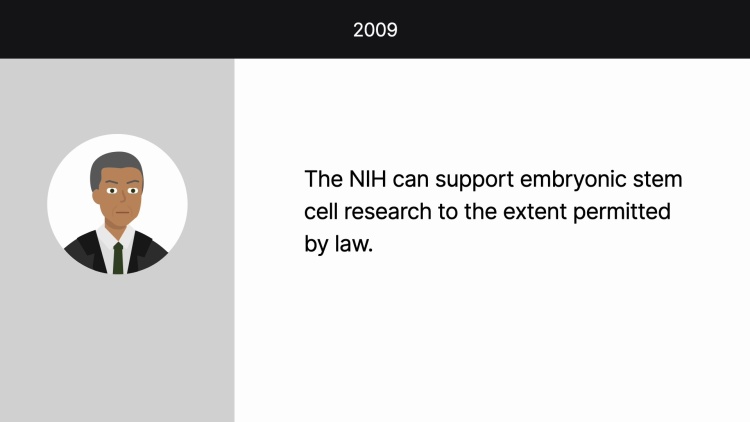Sherley v. Sebelius
United States Court of Appeals for the District of Columbia Circuit
689 F.3d 776 (2012)
- Written by Ann Wooster, JD
Facts
Congressional appropriation bills began in 1996 to prohibit the National Institutes of Health (NIH) from funding research involving the creation or destruction of human embryos. Scientists then discovered how to isolate embryonic stem cells (ESCs) by removing cells from a human embryo, which destroyed the embryo; culturing the cells; and stabilizing the cells into a stem-cell line. After scientists began to isolate ESCs in 1998, adult stem cells remained available, but medical researchers preferred to use ESCs because they could be developed into almost 200 different types of human cells. Research projects using stem-cell lines already derived did not destroy human embryos. In 2009, President Obama issued an executive order stating that the NIH could fund ESC research to the extent allowed by law. The NIH issued new guidelines allowing for the funding of ESC research projects. James Sherley and Theresa Deisher (plaintiffs) performed medical research on adult stem cells and did not agree with the use of federal funds for ESC research. Sherley and Deisher filed suit against the secretary of health and human services and the director of the NIH (the federal health officials) (defendants), claiming that the congressional appropriation bills prohibited the federal funding of research projects that used ESCs already derived from human embryos. Sherley and Deisher sought (1) a declaration that the NIH guidelines allowing the federal funding of ESC research were unlawful and (2) a preliminary injunction to prevent the implementation of the NIH guidelines. The district court rejected the preliminary-injunction request. The district court entered summary judgment in favor of the federal health officials. Sherley and Deisher appealed.
Rule of Law
Issue
Holding and Reasoning (Sentelle, C.J.)
What to do next…
Here's why 899,000 law students have relied on our case briefs:
- Written by law professors and practitioners, not other law students. 47,000 briefs, keyed to 994 casebooks. Top-notch customer support.
- The right amount of information, includes the facts, issues, rule of law, holding and reasoning, and any concurrences and dissents.
- Access in your classes, works on your mobile and tablet. Massive library of related video lessons and high quality multiple-choice questions.
- Easy to use, uniform format for every case brief. Written in plain English, not in legalese. Our briefs summarize and simplify; they don’t just repeat the court’s language.





